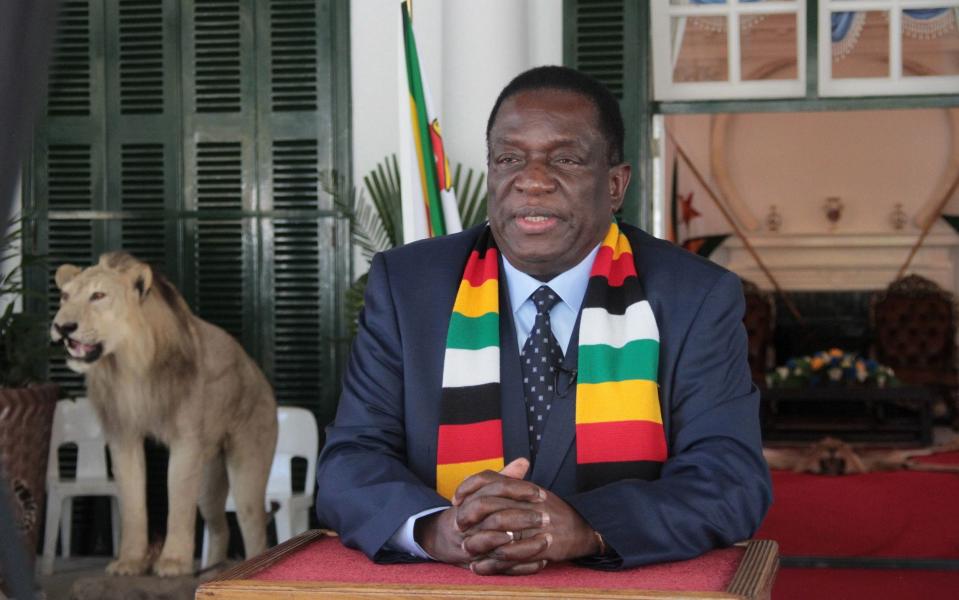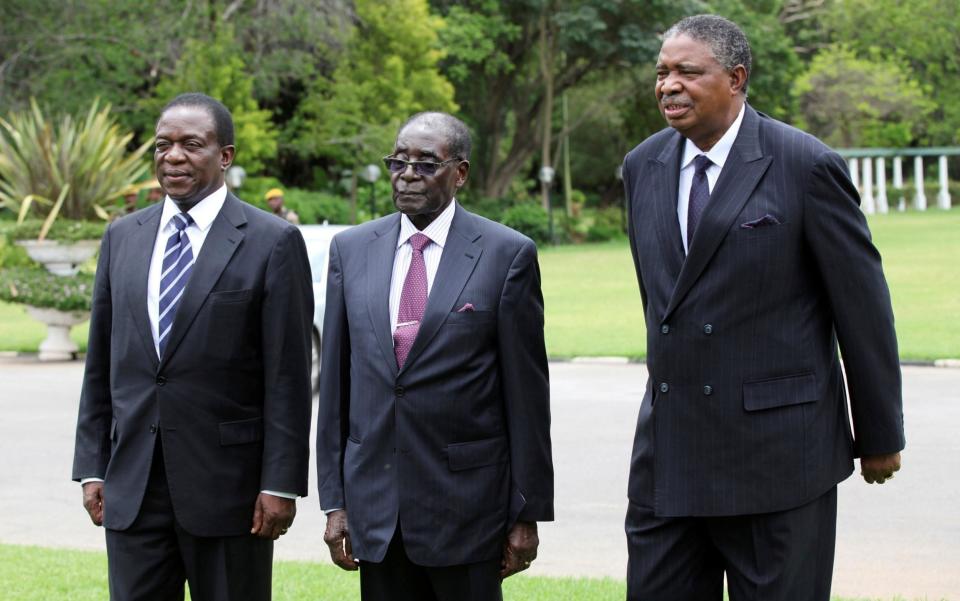After 'abduction' of activists, life in Zimbabwe under 'The Crocodile' looks as bad as with Mugabe

The footage makes for uncomfortable viewing. Sobbing almost uncontrollably, her whole body heaving as she spoke, Zimbabwe’s youngest MP relived her ordeal at the hands of men she is convinced were agents of the state.
Arrested for having the temerity to take part in an anti-government protest on May 13, Joana Mamombe says she was taken into a forest and thrown into a pit with her fellow detainees, two female members of the opposition’s MDC Alliance.
For the best part of 36 hours, the women were allegedly beaten, sodomised with handguns and forced to drink each other’s urine.
For many Zimbabweans, the allegations levelled by Ms Mamombe, 27, carry overtones of the presidency of Robert Mugabe, who was ousted in a coup in 2017 and died last September.
Mugabe’s overthrow, it was hoped, would end the abductions, beatings and extrajudicial killings that characterised both his early and later years.
Anxious to repair relations with the West, Emmerson Mnangagwa, the ruling party apparatchik who both succeeded Mugabe and precipitated his demise, was supposed to represent a clean break with Zimbabwe’s dark past.
Yet even the official response to the ordeal suffered by the the three women of the MDC was heavily redolent of that era.
The police first admitted to having detained the three women after they held a small demonstration in the down-at-heel Harare district of Warren Park and then denied any knowledge of ever having arrested them.
After they were found dumped, their clothes ripped and barely able to walk, on a roadside 50 miles outside the capital, government media sought to imply that the women had staged their own kidnapping.
Even government ministers appeared to make sport of the women’s misery. Energy Mutodi, the deputy information minister, theorised that the women’s injuries were inflicted during a row over payment for sex.
They had tried to make their boyfriends, illegal gold miners, pay for services rendered in precious foreign currency, he surmised, while offering no evidence to support his claim.
And although the government promised to investigate the women’s claims, ministers suggested they would be charged for failing to socially distance at the protest they attended. Meanwhile, two Zimbabwean journalists who interviewed the women have been arrested and denied bail.
Such nastiness certainly bears the hallmark of bygone years, prompting accusations from opposition figures that Zimbabwe is now more repressive under Mr Mnangagwa than it was under Mugabe.
Mr Mnangagwa, after all, is a Zanu-PF man through and through. Not only does he lead the party that has ruled Zimbabwe since independence from Britain 40 years ago last month, but he has often been associated with its most unreconstructed hardliners.
It was he who took charge of crushing dissent in Mugabe’s early years during incessant attacks by former Rhodesians security forces and ‘dissidents’ mostly from the minority Ndebele tribe.
As minister of state for national security, Mr Mnangagwa was accused of presiding over the ‘Gukurahundi,’ as the ethnically charged massacres of thousands of Ndebele opposition supporters was known. The president has always denied the allegations.
But while the ruthlessness of “The Crocodile”, as Mr Mnangagwa is known, made him indispensable to Mugabe, he was always more pragmatic than the mentor he betrayed in 2017. Mr Mnangagwa was brutally tortured by the police as a teenager in Rhodesia and escaped the gallows but served eight years in prison.

The differences remain apparent today. Within 24 hours of making his allegation, Mr Mutodi was quietly sacked. That would not have happened in the old days.
President Mnangagwa’s frequent attempts, so far rebuffed, to patch things up with the West would never have happened under Mugabe, his hatred of the “gay United gay Kingdom” and its cohorts smouldering till the day he went to the grave.
“Zimbabwe is open for business,” Mr Mnangagwa declared, hopefully if unrealistically, after his inauguration.
That pragmatism has seen some of the excesses and abuses of the Mugabe era curtailed.
Mr Mnangagwa has shown little appetite for extending his predecessor’s disastrous land resettlement programme, which saw the invasion and destruction of most of the country’s white-owned farms.
He has even made soothing noises about returning a small number of farms, although this is unlikely to happen.
Some effort has been made to amend or appeal repressive laws, most notably the notorious Public Order and Security Act that became one of the chief instruments of state repression in the Mugabe era.
On the other hand, analysts say, there has been little appetite to embrace genuine change. Zimbabwe’s land and agricultural policies remain unreformed. Human rights activists say the law that replaced the Public Order and Security Act still falls short of international human rights standards. The oppressive media laws have also not be reformed. Nor has devolution - handing some governance to the provinces.
There have, undoubtedly, been human rights abuses, too, including the killing of at least 17 protesters during fuel riots last year and a series of alleged abductions, culminating in the saga involving Ms Mamombe and her colleagues.
Such incidents suggest that the removal of Mugabe has clearly not swept away the repression he implemented. But there are those, like Cyril Ramaphosa, South Africa’s president, who argue democratic progress has been made — and that Zimbabwe is not getting enough credit for it.
Mr Rampahosa is leading calls for a lifting of “sanctions”, as the US's complex financial restrictions against scores of Zimbabwe’s political and and military leaders are usually called, saying that the case for doing so has now become overwhelming because of the Covid-19 pandemic.
“This is time for solidarity and not exclusion or for vengeance or revenge,” he said.

Yet if things are better politically, they are worse economically.
Zimbabwe, which suffered financial devastation as a result of Mugabe’s land programme and other policies, is again in the economic mire. The economy shrank eight per cent last year, annual inflation is running at nearly 700 per cent and the recently-introduced Zimbabwe dollar has lost 90 per cent of its value in the past year.
Mr Mnangagwa cannot be blamed entirely: he has been dealt a rotten hand. Aside from the disastrous legacy he inherited from his predecessor, Zimbabwe has had to deal with a cyclone and two consecutive droughts that devastated the all-important agricultural sector.
The coronavirus pandemic has made matters worse, forcing the government to impose a lockdown. Tourism, vital to the economy, has also collapsed.
But Zimbabwe can rely on little of the relief other African states benefit from because it has yet to pay off debt arrears to international lenders.
The chances of a rapid resumption of World Bank lending were dealt a blow after it was revealed that Zimbabwe’s central bank had resumed printing money. Corruption scandals have also not helped the country’s cause.
The potential for a warm relationship between Mr Mnangagwa’s government and the International Monetary Fund in particular has largely evaporated as a result, according to Tony Hawkins, a Zimbabwean economist.
“It has walked away, and it would have loved to help,” he said.
“At the end of Mugabe’s rule the economy was levelling off and now it is downhill again.”
The economic misery has even sparked nostalgia for the Mugabe years.
“Life was much better under Robert Mugabe,” said Hapious Chitura, the father of three children. “Although he was hard-hearted, he at least had a way of running the country better.
“But right now, people cannot afford a decent meal because prices of basic commodities are increasing daily.”
So dire is the situation that some observers believe there could even be a move from within Zanu-PF to oust the president, and that Zimbabwe, having acquired a taste for coups, could be about to go through another.
Eldred Masunungure, a veteran political scientist at the University of Zimbabwe, suggests that the attack on the three MDC women could even have been orchestrated by an anti-Mnangagwa faction within the ruling party with the intention of discrediting the president and further isolating him internationally.
“There are deepening fractures and at present one hears revival of talk about another coup d’etat,” he said.

 Yahoo News
Yahoo News 